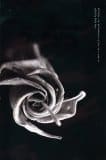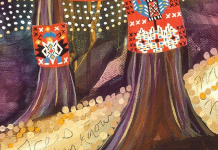 Datura, edited by Ruby Sara
Datura, edited by Ruby Sara
Scarlet Imprint, 9780956720368, 2011
To be honest, I’ve dodged a serious bullet with Datura. When its editor, Ruby Sara, put out a call for submissions on Scarlet Imprint last year, I almost submitted a handful of poems for inclusion. The thought of an anthology of occult-themed poetic work and essays on the mystical aspects of the creative process struck quite a nerve with me, and I was eager to contribute. Luckily a combination of a busy life at the time and a creative dry spell prevented me from sending Sara anything by the deadline, and after reading through Datura, I’m deeply thankful that the few pieces I was able to conjure up never got sent her way. For even if they were accepted and published in the pages of Datura, the quality of the content is so high my work would have looked like utter shit next to everything else between its covers.
Datura contains the work of 26 poets, that work being a mix of 6 essays and 47 poems. When I picked up Datura, I was really eager to read the essays. Scarlet Imprint has published three other anthologies in the past – Howlings, Devoted, and Diabolical – and their occult essays were absolutely stellar. While I do love poetry, and have a deep fondness for the Pagan and fortean realms, I’ve read enough awful odes to Odin and tree-spirits (and composed quite a few myself, to be fair) that the thought of a book devoted to such poetry might be a risky gamble. I figured that six good essays could make up for some lousy astral-poetics. Thankfully while the essay-work is every bit as good as I hoped it would be, the poetry in Datura manages to keep its nimble-feet from stepping into the bear-trap of twee Pagan clichés.
The book has a mix of pieces by established poets like Penelope Shuttle and posthumous work by Peter Redgrove, and work by new writers like Ariel, whose poem “EGRE-GORE” reads like William Burroughs composing a cut-up at the Renaissance Fair, and I mean that in the best possible way. There are so many evocative fragments and resonant lines strewn through Datura’s pages: “her voice in my ear sounded like a pomegranate seed tastes / Ah, the earth, always turning up like a bad penny / the swift boat that turns around the island is a signal in the fibers of his skin”.
The poetry is very visceral, and while some of it is fairly esoteric and will probably baffle people who don’t have the slightest clue what names like Abraxas and Inanna could mean, most of Datura does come across as an accessible read for someone who cares not a whit about the occult but loves some good poetry.
As for the essays: if the rest of Datura was the literary equivalent of a toppled-over port-a-potty, “The Poetry Of Magic” by Paul Newman alone would have justified the books existence. It’s a wonderful piece that discusses animism and occult currents that sweep through so much of poetic history, discussing Coleridge, Dylan Thomas, Yeats, “Hymn To Pan” by Crowley, the “nightmare collage” of Eliot’s “The Waste Land”, and Ted Hughes. Newman’s piece does what all great pieces of cultural commentary should do: it immediately instils in the reader a burning desire to dive into the depths of work that the commentator casts a light on. I’ve never any Hughes but after reading “The Poetry Of Magic” I’m eager to give him a whirl.
The other essays are also quite good. “My Grandmother’s Hands” by John Harness discusses the Roman practice of Defixiones and the meaning of the phrase “to cast a spell”, Mr. VI’s “Mead & Raven” talks about Odin and the madness of poets (the one line that sticks out of his piece the most is when he writes on the need for balance between Left Hand and Right Hand practices: “an equal worker of both hands- not a practitioner of the so-called middle way, but rather a creature of flight & burrowing both”), “Becoming Poetry” by Erynn Rowan Laurie that delves into the Celtic view of the creative energies being like a cauldron inside the body boiling over with fervent words, and editor Sara’s fantastic “Charm Maker” essay which includes this succinct description of her creative process:
Catalyst. Pentecost. Write. Despair. Edit. Despair. Edit. Read out loud. Despair. Edit. Read out loud. Laugh. Make tea. Close eyes. Reopen Eyes. Edit. Edit again. Stop and pray: There but for the grace of my god goes this poem… for it is finished! Wait three weeks. Edit.
My only complaint with the book is its price.
Scarlet Imprint are a talismanic book publisher from the U.K., which means limited print runs, fancy binding (the books are beautiful, all of them), and absolute murder once pounds are converted into U.S. dollars for yours truly.
Considering the niche market they work within and the relatively narrow appeal these books hold, I can’t blame them for their pricing, and I sincerely hope that they are able to keep publishing for years to come. But it is the main reason why I have a hard time recommending their excellent books to folks I know in the States. Aside from out-of-print Kenneth Grant books, the Scarlet Imprint books are the priciest tomes in my collection, and its hard to write a review of this book (which is outstanding) without pointing out that if you’re ordering it internationally you are looking at around $75 (in U.S. dollars, that is).
I do hope that one day Scarlet Imprint may be able to produce cheaper versions of their older books or even issue anthology samplers of their material for a wider audience, because as occult publishers go, I can’t think of anyone else right now publishing material as vital, as compulsively readable, and forward-thinking as they are. Here’s hoping that reaction will be positive enough to Datura that they and Ruby Sara put their heads together and produce another collection of ecstatic verse in the future. And maybe I’ll be able to craft work worthy of rubbing shoulders with their current scribes if and when the next call to submit goes out.
First published on Plutonica.net as “Creatures of Flight & Burrowing Both: On the magick & poetry of Datura” on 12 May 2010.








